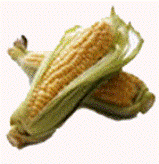Corn (Maize)

  | Corn (Maize) in TCM:Explore the properties of Corn (Maize) according to Chinese
Nutrition and Traditional Chinese Medicine (TCM):
Temperature: cool
Channels: LI, ST, SP, HT, KD, LV, GB
Flavors: sweet
Tonifies: qi
Special Properties:
clears heat, resolves water accumulations, eliminates toxins, stops bleeding
Special notes: In the USA today more than 90% of corn is genetically modified. The molecular structure of GMO corn is significantly different than corn used in ancient times. The information below applies to non-GMO corn only.
In terms of Traditional Chinese Medicine (TCM) Corn, also known as maize, is known for its ability to tonify qi, clear heat, stop bleeding, promote urination, and resolve water accumulations. It may also help to lower blood pressure.
In general the ancient Chinese medical texts cite that corn enters the Kidney, Large Intestine, and Stomach. Modern sources also reference that is can benefit disorders of the liver and gallbladder [22]. The flavor of corn is sweet, and it is considered to be neutral in temperature.
Corn is known as a diuretic which nourishes the physical heart, influences the stomach, improves appetite, and helps regulate digestion. Corn may also help to promote healthy teeth and gums, tonify the kidney, and overcome sexual weaknesses. "Drink a tea decoction made from whole dried corn kernels to treat kidney disease (HWWF 465)".
Because corn is very low in Niacin, some ancient cultures developed diseases related to Niacin deficiency such as pellagra. When corn is prepared with lime, such as in Native American cultures, bodily absorption of niacin increases.
Fresh corn on the cob contains more enzymes, more vitamins, and is better suited to warmer persons with robust constitutions than dried corn. Corn may help with high blood pressure, hepatitis, gallstones, and jaundice[22],
Corn silk is a core Chinese herb [see also: Yu Mi Xu]. Corn silk is highly diuretic and can be used as a tea infusion for urinary difficulty, high blood pressure, gallstones, edema, and kidney stones. Corn silk is neutral in thermal properties.
Blue corn is indigenous to southwestern America and was used by the Hopi and Navajo people as a staple. Blue corn is cool, sweet, and sour. It influences stomach and tonifies the kidneys. Blue corn contains 21% more protein, 50% more iron, 2x manganese, and 2x potassium compared to yellow or white varieties. When ground its blue sheen gives a special quality to any recipe.
For hypertension, jaundice, and gallstones eat corn regularly and drink fresh corn silk tea. To clear toxic heat drink corn silk and dandelion tea. For swelling or difficulty urinating drink cornsilk and chrysanthemum tea. For blood in the urine drink corn and lotus root tea. [22]
Cornmeal stimulates the flow of bile and can help with hypertension, heart disease, weak digestion, edema, and gallstones. For weak digestion, or to facilitate recovery from cold and flu, make a porridge with corn meal. For edema, difficult urination, or high blood pressure eat cornmeal regularly and drink corn silk tea.[22]
Disclaimer: In accordance with our terms of service, by using this web site you agree that none of the information found on this web site constitutes medical advice. You should always consult your doctor before trying any particular food or herbal remedy to treat disease.
Folk remedies presented on this site are designed to address specifc TCM diagnoses, and are not one-size-fits-all. If you would like to learn more about Traditional Chinese Medicine (TCM) and how it relates to Chinese Nutrition, you can book in a free call with a licensed professional. There is no obligation to purchase.
[CLICK HERE for your free INITIAL CONSULTATION] |

